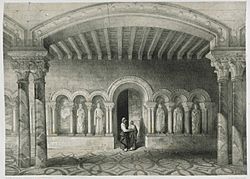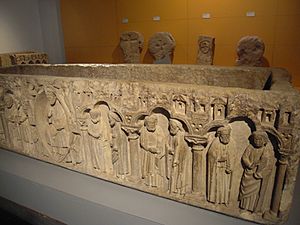Monastery of Benevívere facts for kids

Dans le Monastère de Bénévivere by Jean Charles Léon Danjoy (1841)
|
|
| Monastery information | |
|---|---|
| Order | Augustine |
| Established | 1169 |
| Disestablished | 1835 |
| Site | |
| Location | Near Carrión de los Condes, Spain |
| Coordinates | 42°20′N 4°39′W / 42.34°N 4.65°W |
The Monastery of Benevívere (Spanish: Abadía de Santa María de Benevívere) was a famous abbey in Spain. It was built in the 12th century but is now mostly in ruins. You can find its remains about 4.8 kilometers (3 miles) west of Carrión de los Condes in the Province of Palencia.
Contents
History of the Monastery
How it Started
The Abbey of Santa Maria de Benevívere was ordered to be built in 1169. A powerful Spanish noble named Don Diego Martínez de Villamayor started it. He was an important advisor to kings Alfonso VII and Sancho III. He also managed money for King Alfonso VIII.
After his wife passed away, Don Diego decided to live a quiet, religious life. He laid the first stone of the Abbey in 1169.
The Poem of Benevívere
Around the early 1200s, a long poem called the Poema de Benevívere was written. It had 758 lines and was in Latin. The poem told the story of Don Diego Martínez de Villamayor and King Alfonso VIII. It showed how religious goals and worldly goals could be connected.
Life at the Abbey
Who Lived There
The monastery was home to Canons Regular. These were priests who lived together in a community, following the rules of Saint Augustine. Their way of life was approved by several popes, including Pope Alexander III and Pope Lucius III.
Helping Others
The Abbey of Benevívere was very important. It had other smaller religious houses that followed the same rules. These included Trianos in León and Villalbura in Burgos.
The founder also built a hospital next to the abbey. It was called the White Hospital or San Torcuato. Monks from the abbey ran this hospital, helping travelers and pilgrims. The abbey also supported the local farmers in the area.
What Happened to the Abbey
Its Downfall
In 1835, the monks lost their property. This happened because of something called the Ecclesiastical Confiscations of Mendizábal. During this time, the Spanish government took away many church properties.
The monastery was sold in 1843. Sadly, most of it was torn down. People like Valentín Carderera tried to save it, but they were not successful.
Where Things Are Now
Today, most of the monastery's old papers and documents are kept in the National Historical Archives in Madrid. Other items from the abbey can be found in a park in Carrión de los Condes and in different museums.
For example, a special stone coffin, called a sarcophagus, from Benevívere is now in the Palencia Museum. It was carved by Roy Martínez de Bureba y de Bame. Only a few small parts of the abbey remain at its original site today.
See also
 In Spanish: Abadía de Santa María de Benevívere para niños
In Spanish: Abadía de Santa María de Benevívere para niños
 | Precious Adams |
 | Lauren Anderson |
 | Janet Collins |



